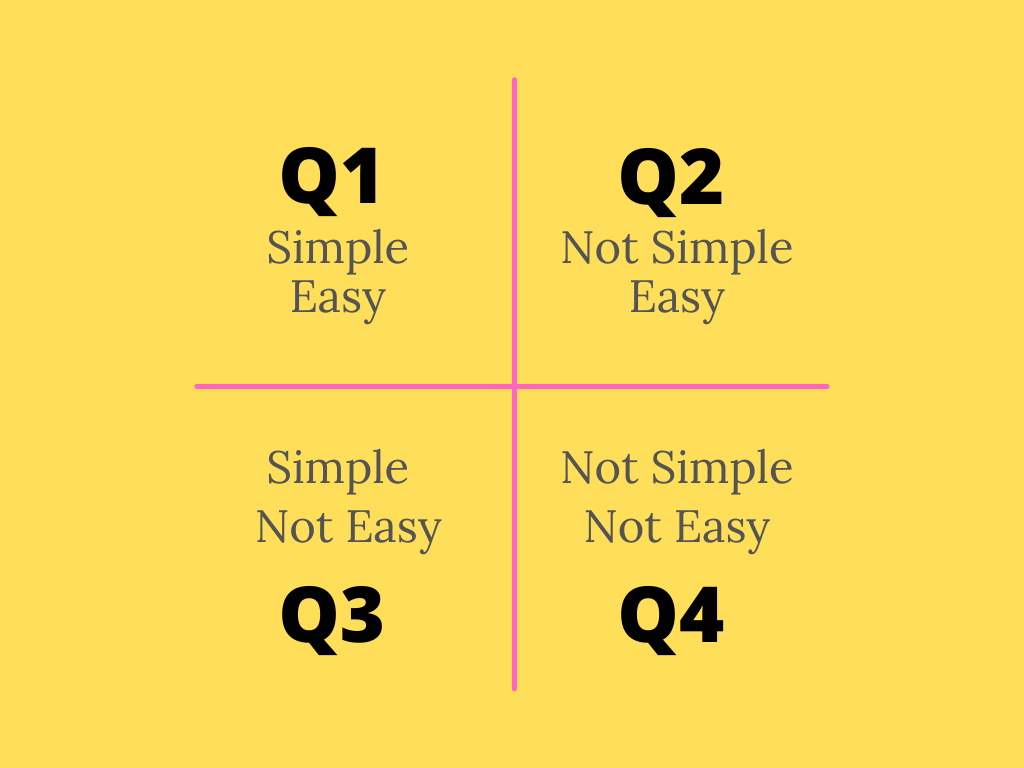We are wired differently. Certain things are more in tune with our unsaid preferences and prejudices that we find straightforward to comply with. Most times, it has very little to do with the actual task.
A few of you found sitting at a desk and listening to a teacher easy. Writing exams was simple. A few of you found sitting at a desk impossible, let alone paying attention. You froze when you wrote exams even though your prep was exceptional.
It happens.
Using simple and easy, I want to walk you through 4 quadrants.
Simple: not complex or fancy.
Easy: requiring or indicating little effort, thought, or reflection.
What I've seen is the less thought that's required to do something, the lower the barrier for entry. The less thinking and the more "Do This!" there is, the better the compliance and adoption.

Certain things are simple. Certain things are easy. Some are both. Some are neither. Understanding which quadrant they fall into will help you figure out what to dabble in and try out. And most of us will progress from Quadrant 1 to 2 to 3 to 4. A few might be able to make the jump directly to Q3 but that's dependent on some innate wiring going on already.
Quadrant 1: Simple + Easy
Walking.
It is simple. And easy. There's minimal skill requirement. There's minimal thought requirement i.e. what am I supposed to do and how am I supposed to do it.
Machine-based work at the gym falls here too. The machines have a low barrier to entry. It is hard to do them wrong.
Quadrant 2: Not Simple + Easy
Most diets fall here. Because of their strictly defined nature, it is easy to know what to do. It is easy to know when you've made a mistake.
Calorie counting seems to fall over here. It is tedious, requires a high level of detail, and it is beyond me to do it for longer than a week. But there are so many apps out there that make it easy for you to do.
Diets are clearly defined, thus requiring minimal thought. The effort involved is high but seems very doable for most beginners. They tend to be a bit complex, involving the removal of a food group or a lot of foodstuffs.
Once you get the hang of it, it gets even easier. But it does not get simpler - because there's a lot of complexity involved in navigating life. A ketogenic diet, for example, is not an easy diet to follow. Even a low-carb diet makes it hard and awkward in social situations. It is easy to follow but not simple at all.
Quadrant 3: Simple + Not Easy
The Daily9 system falls here. It requires you to know a lot more about your food, it requires you to eat a minimum amount of protein and vegetables. It requires you to get your sleep going. None of these is easy. For someone who has not eaten vegetables, upping the quotient is not an easy process.
But it is a simple system because it places extremely few constraints. You can follow any cultural way of eating, you can mix-and-match, you can eat one meal a day or 10. It doesn't matter. It conforms to however you want to eat.
There are a million ways to skin the system to make it work for you.
That makes life simple.
But it requires you to put your thinking hat on. Which means it is not as easy as calorie counting.
Contextualising is the difficult part for most of us. But once you do, it becomes simple and easy.
Quadrant 4: Not Simple + Not Easy
Transformations come here. They are neither simple nor easy. They require an inordinate amount of work, on top of ensuring all of your life is aligned and ready to take on the stress. You will need to follow a specific diet, most probably keeping a rather keen eye on calorie consumption and macronutrient consumption, have an intense training schedule, and of course, ensure you are getting enough sleep.
And you will need to do this for a few months.
What do you do with this?
For some of you, calorie counting might fall on simple + easy. That's what a lot of nutrition apps are betting on, and I can totally see how it leads there, after repeated use.
For some of you, walking might not be simple + easy. Maybe you have severe time constraints and solving that is not straightforward.
There's value in understanding what the toll of a task is. Some demand more time or more energy or both, and they form a barrier to entry. Calorie counting for me is impossible and D9 is second nature, but for a lot of folks, it is the other way around.
Knowing where things fall in your context is always a valuable tool. So, you know how much to invest and how long.
For the long-term, simple works. Easy works.
